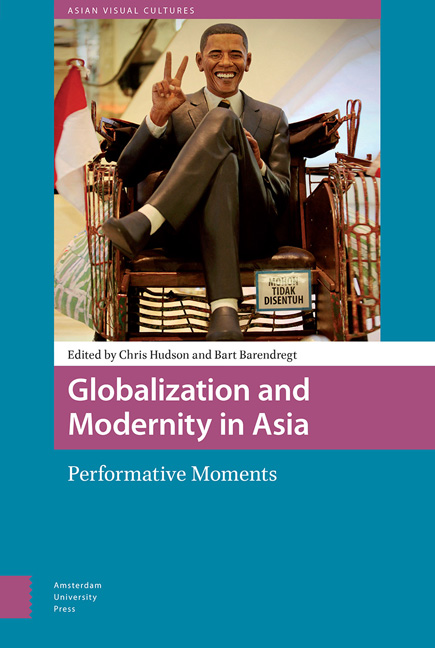Book contents
- Frontmatter
- Contents
- List of Figures
- Acknowledgments
- 1 Global Imaginaries and Performance in Asia
- 2 Globalizing the Imagination: Introductory Reflections
- 3 Weddings, Yoga, Hook-ups: Performed Identities and Technology in Bali
- 4 Super Premium Soft Double Vanilla Rich and the Ideal of Convenience in Japan
- 5 Unearthing the Past and Re-imagining the Present: Contemporary Art and Muslim Politics in a Post-9/11 World
- 6 Keeping Communists Alive in Singapore
- 7 Performative Pedagogies: Lifestyle Experts on Indian Television
- 8 Performing Cities: The Philippines Pavilion at the 2010 Shanghai International Exposition
- 9 Mobile Performance and the In-between: Yogyakarta Comes to Melbourne
- 10 An Islamist Flash Mob in the Streets of Shah Alam: Unstable Genres for Precarious Times
- 11 Pure Love?: Sanitized, Gendered and Multiple Modernities in Chinese Cinemas
- 12 Yogya on Stage
- Index
3 - Weddings, Yoga, Hook-ups: Performed Identities and Technology in Bali
Published online by Cambridge University Press: 11 December 2020
- Frontmatter
- Contents
- List of Figures
- Acknowledgments
- 1 Global Imaginaries and Performance in Asia
- 2 Globalizing the Imagination: Introductory Reflections
- 3 Weddings, Yoga, Hook-ups: Performed Identities and Technology in Bali
- 4 Super Premium Soft Double Vanilla Rich and the Ideal of Convenience in Japan
- 5 Unearthing the Past and Re-imagining the Present: Contemporary Art and Muslim Politics in a Post-9/11 World
- 6 Keeping Communists Alive in Singapore
- 7 Performative Pedagogies: Lifestyle Experts on Indian Television
- 8 Performing Cities: The Philippines Pavilion at the 2010 Shanghai International Exposition
- 9 Mobile Performance and the In-between: Yogyakarta Comes to Melbourne
- 10 An Islamist Flash Mob in the Streets of Shah Alam: Unstable Genres for Precarious Times
- 11 Pure Love?: Sanitized, Gendered and Multiple Modernities in Chinese Cinemas
- 12 Yogya on Stage
- Index
Summary
Abstract
From its earliest days as a tourist destination, Bali has served as a stage for personal transformation and reinvention, acted out by expats and tourists in search of the exoticism and spirituality supposedly offered by Bali. This chapter traces the growth and practice of three contemporary phenomena in Bali and how they function as virtual and/or physical spaces in which individuals can try on different identities, to be later either discarded or kept. The three phenomena discussed are: destination weddings; Eat, Pray, Love tours and yoga; and the Internet gay dating app Grindr. Besides creating spaces in which to enact provisional identities these phenomena also interact with more traditional Balinese cultural and social structures, refashioning local culture at an astonishing rate. In this way, Bali's image as a place of spiritual and personal transformation and renewal has been extended through technology, with traditional representations of Bali merging with New Age spiritual notions and expat entrepreneurship, and purveyed through the Internet.
Keywords: Bali, weddings, yoga, technology, performed identities
From its beginnings as a centre for international tourism in the early twentieth century, Bali has served in one way or another as a stage for the creation and re-imagination of performed identities, generally those of Westerners seeking exoticism (or seeking to become exotic themselves), and more recently including those from other parts of Asia as well. The idea of personal transformation has proven central to Bali's image in the world of international travel and tourism: early tourists and researchers went to Bali to encounter the exotic, the spiritual, or the primitive, and to discover in themselves something more authentic, or to mark themselves as different because they had found a supposed authenticity, and to a surprising degree, this still holds true. As MacCannell's early work shows, tourists are pilgrims in search of authenticity (MacCannell and Lippard 1999), and this is still the case in Bali. Writers including Adrian Vickers (1989), Uni Wikan (1990), Kathy Foley (1992) and many others (see, for example, Latrell 1999, 2000, 2008) have written about the elastic Balinese version of exoticism: from the French theatre critic Antonin Artaud (1976: ‘On the Balinese Theatre’ [1931]), to American writer and self-help guru Elizabeth Gilbert, author of Eat, Pray, Love (2006), Bali has served as a sort of Rorschach test of what it means to be exotic, illuminating as much about the observer as it does about Bali.
- Type
- Chapter
- Information
- Globalization and Modernity in AsiaPerformative Moments, pp. 35 - 56Publisher: Amsterdam University PressPrint publication year: 2018



